Who are the Rohingya?
They are ethnic minority Muslim people living in Myanmar's western Arakan state.
According to historians, Rohingya have been living in Myanmar, the country also known as Burma, for seven centuries. They are descendants of Muslim migrants from India and China as well as earlier Arab settlers. Their religion is a Sufi-infused Sunni Islam.
Because the Myanmar government restricts their educational opportunities, many pursue fundamental Islamic studies in mosques and religious schools that are present in most villages. They speak a dialect of Bengali, which is spoken in Bangladesh and parts of India.
How are they treated by the Myanmar government?
The United Nations has described Rohingya in Myanmar as among the world's most persecuted people.
In 1982, a special law was passed that rendered them stateless without basic citizenship rights. They are not allowed to travel without official permission, and were previously required to sign a commitment not to have more than two children, though the law was not strictly enforced.
In 2012, they were the target of violent Buddhist mobs that forced more than 140,000 from their homes into squalid camps.
In March last year, the Myanmar government banned the word Rohingya and asked for registration of the minority as Bengalis in the country's first census in three decades. It meant that 1.3 million Rohingya in Arakan, which is also called Rakhine state, were not included in the census.
On April 1, the government formally rescinded the temporary ID or "white cards" that were the last form of official government identification for Rohingya, stripping them of voting rights which had been linked to the cards.
Why are Rohingya persecuted?
Despite Rohingya having lived in Arakan for centuries, Myanmar's Buddhist military rulers claim they are not a genuine ethnic group, but illegal Bengali immigrants from Bangladesh.
Why have 25,000 Rohingya fled Myanmar in the first three months of this year and more than 50,000 last year?
Over centuries, millions of destitute people have made the journey from South Asia across the Bay of Bengal to south-east Asia in search of trade, employment and better lives. But an exodus of Rohingya living on both sides of the Myanmar-Bangladesh border accelerated because of ongoing persecution and their hopes they could reach Malaysia, where many have relatives, or other destinations.
What prompted the current crisis?
For years, near-destitute Rohingya were sucked into human trafficking networks operating boats from Myanmar and Bangladesh to Thailand, where they were often held captive in jungle camps or in boats at sea while money was extorted from their relatives.
Many disappeared without trace. Many others reached Malaysia where they were quietly allowed to stay because they provided cheap and indispensable labor.
The trade of human cargo was protected by corrupt and powerful Thai figures, including politicians and police.
But when mass graves were discovered in smuggler camps near the Thai-Malaysian border in April, Thailand's military government was stung into cracking down on the networks as it faced being left in the lowest tier of the US State Department's influential annual Trafficking in Persons Report, as well as a potential European Union ban on Thai seafood - a response to slavery in the fishing industry.
The crackdown prompted traffickers to abandon thousands of Rohingya in camps and in boats at sea, and Thailand, Malaysia and Indonesia declared them unwelcome on their shores.
How many have been rescued?
More than 2500 Rohingya and Bangladeshis have washed ashore in boats in Indonesia, Malaysia and Thailand in recent days. Hundreds of them were rescued when their boats broke down off Indonesia's Aceh province, while hundreds more swam ashore after their boat sank.
How have regional countries responded?
Thailand has called a summit of 16 regional nations and international agencies for Friday, May 29.
Malaysia and Indonesia last Wednesday agreed to allow an estimated 7000 people still adrift at sea to come ashore provided that other countries and international agencies pay for them to stay in temporary accommodation. Indonesia has reportedly told Australia that 60 to 70 per cent of the 7000 people are illegal labourers from Bangladesh, with the remaining 30 to 40 percent Rohingya asylum seekers. Malaysia and Indonesia stipulated the migrants and asylum seekers must be moved to other countries within a year.
Myanmar at first played down its responsibility for the mass exodus from [Rakine state] Arakan, but in the face of international condemnation issued a conciliatory statement saying it would do what it can to help without providing any detail.
What has been Australia's response?
Prime Minister Tony Abbott emphatically ruled out Australia taking in any Rohingya caught up in the crisis, saying ''nope, nope, nope''. His response provoked a sharp rebuke from Indonesia.
Foreign Minister Julie Bishop said the problem needed to be dealt with at its source, which stemmed from Myanmar's denial of citizenship to Rohingya.
Australia will send a delegation to the May 29 summit.
What is the likely fate of the Rohingya and Bangladeshis still at sea, and those who have come ashore in Thailand, Malaysia and Indonesia in recent weeks?
South-east Asian nations are likely to agree at the May 29 summit to establish temporary camps, probably in Thailand, with assistance from the US and other countries. But Indonesia and Malaysia insist they must be repatriated to other countries or be sent back to Myanmar or Bangladesh within a year.
Analysts say unless Myanmar ends its persecution the Rohingya will continue to flee the country in what has become the largest movement of people across south-east Asia since the fall of southern Vietnam 40 years ago.
REPORTERS ON THE RUN
Phuketwan journalists Alan Morison and Chutima Sidasathian will be in Bangkok for the Special Meeting on Irregular Migration in the Indian Ocean and available on the sidelines for interviews about the precedent-setting military versus media criminal defamation case brought against them by the Royal Thai Navy.
The criminal defamation and Computer Crimes Act case, with a seven-year jail term as a maximum penalty, centres on Phuketwan's word-for-word republication of a Pulitzer-Prize winning Reuters' paragraph that does not mention the Navy.
''As long as the Royal Thai Navy pursues these false charges, reporters and editors in Thailand and around the world cannot and will not accept the military government's word that it understands the universal principles of media freedom and democracy,'' says Morison.
Morison and Khun Chutima are obliged to begin serious preparations for their July trial from June 1. Please call Khun Chutima (''Oi'') on 089 4725117 to arrange an interview sometime between 2pm Thursday and noon Saturday.
WATCH How Trafficking Works
Phuketwan Investigative reporter Chutima Sidasathian, still being sued for criminal defamation over a Reuters paragraph: ''It's worse and worse, day by day. Nobody cares''.
http://journeyman.tv/67116/short-films/rohingya-hd.html
LISTEN The Rohingya Solution
A tragedy almost beyond words has been unfolding in Thailand, where a human smuggling network is thriving with the full knowledge of some corrupt law enforcement officers. Alan Morison of Phuketwan talks to Australia's AM program.
http://www.abc.net.au/am/content/2015/s4231108.htm

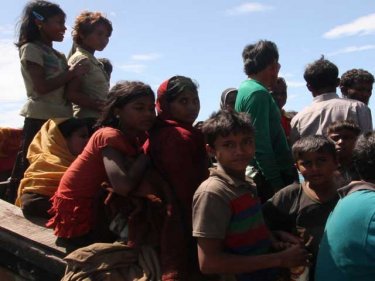
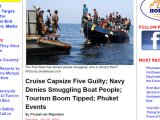
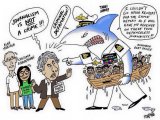
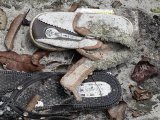
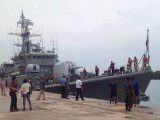


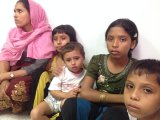





No mention of why they are where they are, and who put them there? (Clue UK).
Posted by Sean on May 28, 2015 13:49
Editor Comment:
Seven hundred years? Don't think the Brits were around then.